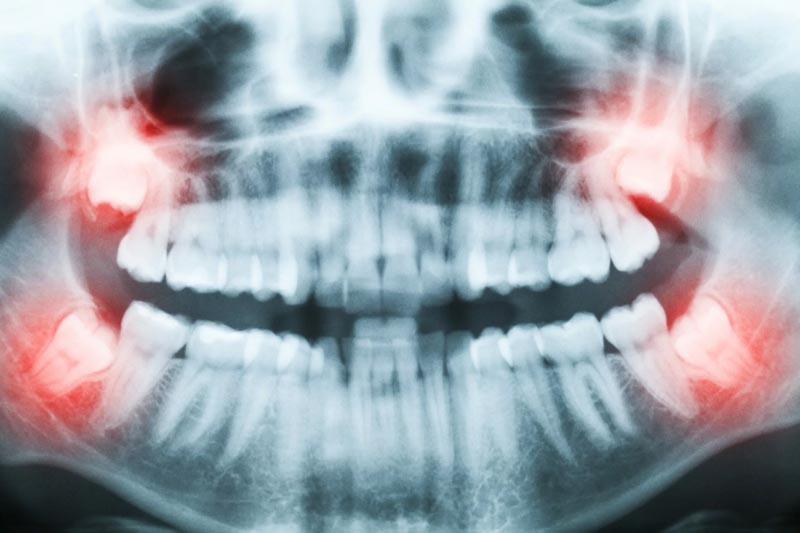Wisdom Teeth Have Lost Their Purpose as Humans Have Evolved

As we grow older, teeth begin to grow in. In early adolescence, our incisors emerge, and canines, premolars, and molars swiftly follow. From infancy to adolescence, we grow our first set of teeth, lose them, then an entirely new set replaces them. Each set of teeth has a purpose. The sharper teeth in the front tear food into smaller pieces, while the flatter teeth in the back grind food down. The third and final set of teeth does not make themselves known until early adulthood, somewhere between ages 17-21. These are known as wisdom teeth.
You are presumably wiser the older you get, hence the reason for the name of these teeth. However, many people wonder why these teeth grow in when they usually end up being removed from the mouth. Even though they serve no purpose now, they once did.
Why We Get Wisdom Teeth
Anthropologists believe that our early ancestors survived off of a diet of raw meat, nuts, roots, berries, and leaves. Early humans did not have the eating utensils such as knives and forks to cut their food nor were they able to cook their food to soften it up, making chewing easier. A stronger, broader jaw was needed to chew through tough foods.
Larger jaws were very common in our ancestors, making it easier to accommodate wisdom teeth. They were able to grow in normally along with the rest of their teeth. However, the jaw of the average human today is much smaller. Some scientists believe our jaws have gotten smaller to accommodate the space for our growing brains.
Along with this, our diets and dental needs drastically changed as well. We have utensils and different cooking methods to make eating easier. Because of these changes, our jaws decreased in size, limiting the space for our wisdom teeth.
While the need for these teeth has disappeared, genetics still cause most adults to develop them. However, many researchers would not be surprised if there came a day when nobody had wisdom teeth anymore. Unfortunately, that’s not the case today. A study found that at least 53% of people have had at least one wisdom tooth grow in with men more likely than women to get them.
Why They Are Removed
As we mentioned earlier, human jaws have evolved to grow much smaller than our ancestors’. Four wisdom teeth initially grow in, two on the top and two on the bottom on each side. Most people can grow anywhere from one to all four. Regardless of how many grow, they still can cause issues.
By the time you are 18 years old, your jaw will most likely be done growing. However, most wisdom teeth do not start to emerge until you are around 19.5 years old. The issues caused by them are more than likely due to them not fitting. Many of these issues include:
- Crooked teeth
- Crowded teeth
- Wisdom teeth growing in sideways
- Tooth decay increasing
- Increased jaw pain
Just because you can’t see your wisdom teeth, does not mean they aren’t there. Some wisdom teeth never emerge and never become visible. An X-ray is needed to confirm if you have wisdom teeth under your gums. When wisdom teeth cause issues through the gums, they are known as impacted wisdom teeth.
Wisdom Tooth Removal
It is recommended that during the teenage years, you should be evaluated for wisdom teeth removal surgery. The younger you are when your wisdom teeth are removed, the better the recovery is. If you ever beginning to experience one or more of the above symptoms, you should contact Cosmetic & Family Dentistry for wisdom tooth extraction. While there will always be risks with any surgery, it is important to discuss with your dentist about your options to properly monitor your oral health.
Wisdom teeth are the third and final set of teeth you grow as you get older, but they no longer serve a purpose. Because of how we have evolved, our mouths are too small to properly house these extra teeth. A handful of dental problems can occur once wisdom teeth emerge. That is why it is important to have the help of the trusted dental and oral care experts at Cosmetic & Family Dentistry of Las Colinas on your side to guide you through this situation.
- Awareness16
- Bad Breath1
- Bone Grafting1
- Braces4
- Causes, Symptoms, And Treatments6
- Cavities5
- Chewing Gum1
- Cosmetic Dentistry of Las Colinas15
- COVID-192
- Deep Cleaning7
- Dental Anxiety1
- Dental Bridge2
- Dental Care27
- Dental Cleaning6
- Dental Crown1
- Dental Filling1
- Dental Health24
- Dental Implants6
- Dental Sedation1
- Dental Visit1
- Dental X Ray3
- Floss1
- Gum Dieseases4
- Injury1
- Insurance1
- Invisalign8
- Oral Cancer1
- Oral Hygiene24
- Root Canal9
- Sleep Apnea2
- Tartar1
- Teeth19
- Thanksgiving1
- TMJ1
- Tongue1
- Veneers2
- White Teeth12
Get Your Best Smile With Us
